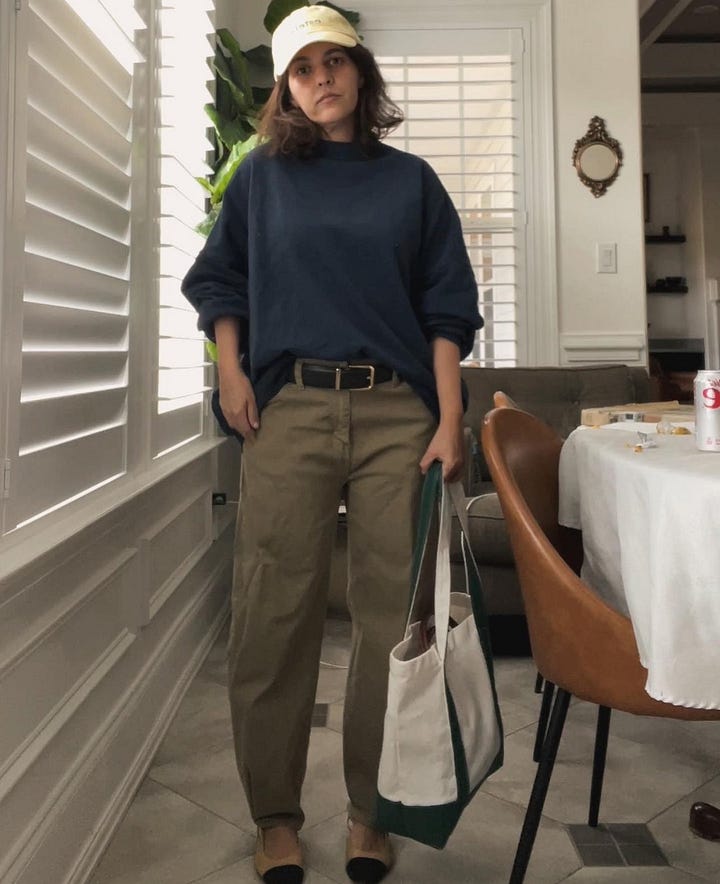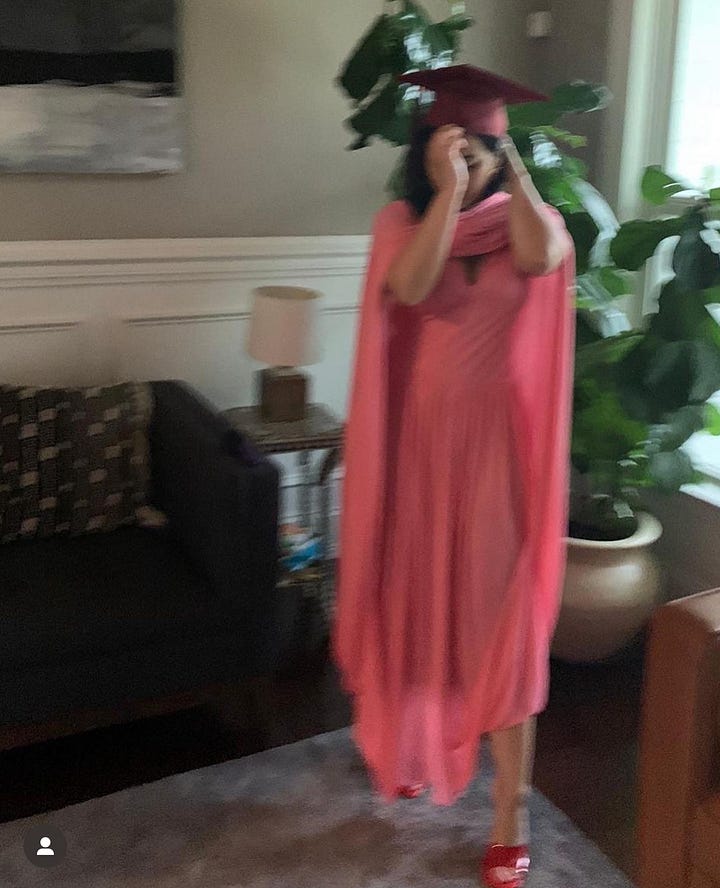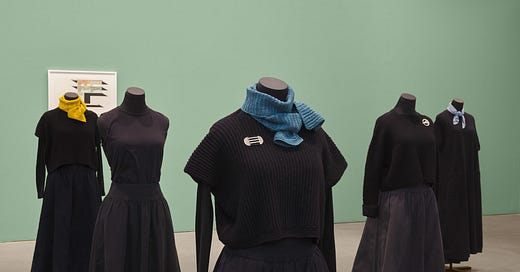I often think about the double-edged sword of consumption, its power to both liberate and oppress. This idea is obviously not mine—I first encountered it on an essay from one of my favorite artists, Andrea Zittel, whose remarkable body of work explores the concept of personal uniforms. Quite beautifully, in my opinion.
This is how I see the dichotomy: on one hand, there's the message of sentimental value, encouraging us to treasure objects of extraordinary quality that carry meaning. It suggests that it's noble to buy more as long as the product is not disposable, as long as it’s ethically made with love by artisans’ hands in Latin America using ancestral techniques, as long as it’s not polyester, as long as the principles of girl math are carefully factored in and the resale value is not marginal on TheRealReal. From this point of view, consumption liberates us from mindless accumulation that only messes up our carefully curated wardrobes, obscuring our true personal style, and polluting the earth in the process. That great quality blazer that we will wear a lot liberates us from wanting those poorly made ones from Zara, from being fashion victims, from looking in the mirror and not feeling identified with what we see. It will give us lasting joy and a closer relationship to an authentic self that we have pinpointed completely.


Conversely, there’s the anti-consumption message which doesn’t need much elaboration. We have all been warned of the market's persuasive tactics that promise fulfillment through products, fulfillment that quickly dissipates leaving us again alone with our void. And a credit card bill.
An even more disturbing idea my friend who reads Lacan suggested the other day? That there is no “real self” or a mystical “core essence” that The Row jelly flats have the power to reveal to the outer world. That who we think “we truly are” is just a conglomerate of mixed messages we have absorbed from culture, our environment, and of course the algorithm. Nothing innate. Nothing fundamental. Just the market tricking us into believing that we have a true self we can express through objects when in reality it is just a mechanism that keeps us trapped in the hamster wheel, generating a new desire the second an old one is fulfilled.
He is actually really fun at parties.
But regarding the consumption paradox, context matters. For instance, in an oppressive regime like Communist Russia where there was no freedom, access to fashion beyond the mandatory uniform was indeed extremely liberating. Looking different and breaking free from the uniform was desired and idealized. Joy, or glimpses of it, was found in the little things such as finding a piece of fabric and making something similar to what they saw in contraband fashion magazines (there’s an enlightening podcast by Articles of Interest on Fashion without Capitalism.) In stark contrast, today's neoliberal landscape offers unprecedented access to material goods; however, if we have to get in debt to get that jelly flat from The Row thinking it is going to give us everlasting joy, consumption starts to sound…pretty oppressive to me. Yes, no one is physically forcing us to buy the shoes. Not the government, not Vogue, not your favorite influencer’s sponsored post. Only ourselves who have bought into the idea of consumption having the power to give us everlasting joy. Emphasis on everlasting.


Regarding the possibility to stand out that fashion offers in a free-market world: do you think looking different is still aspirational? It seems to me that there's now a stronger inclination to use clothing to conform, to try to climb social hierarchies, to assimilate into new societies that see us (immigrants etc.) with disdain.




Also, the proliferation of fast fashion has blurred local idiosyncrasies, resulting in a global uniformity where cities and groups, while retaining certain codes, increasingly resemble each other. What's worn on the L train in New York today could easily be emulated in a Buenos Aires street tomorrow. For those with an eye for fashion who wish to appear “in the know,” walking into Zara and adopting a designer “avatar”—whether it's Simone Rocha or Lemaire—seems easier (and more tempting) than ever. While each of us may choose a different avatar to emulate, the reality is that we don’t look as unique as we might think; instead, we often resemble armies of luxury brand enthusiasts. Yes, including those who would never want to be mistaken for social climbers and resort to unbranded The Row’s clothes to present themselves to the world using the codes from Soviet Russia (there’s a great newsletter about this written by Totally Recommend titled “It Costs a Lot to Look This Poor”). Does it seem to you that what was once a socialist ideal—homogenization—has become a reality in our neoliberal world, albeit by choice, one would hope?
Because yes, we are freer now. And may we never return to another communist regime—or any regime that robs us of the ability to choose, or at least the illusion of choice. But how do we handle all this newfound freedom? Are some self-imposed limitations or old good restraint (not restriction) what we need more of in order to experience true liberation? How do we navigate what my Lacanian friend calls “the abyss of perpetual desire”? How do we ensure that each purchase is a step towards genuine freedom rather than a perpetuation of the silly and costly consumption cycle we easily fall into? And even more importantly, what is the true self we trust our Tibi Liams to project to the world? Is it who we truly are (if such a thing exists)?
I would love to end this with “And also here are the 10 best Jelly shoes that look exactly like The Row” but all I got is a bunch of unanswered existential questions for you to unpack. Or unbox—as the kids on Tik Tok would say nowadays.
And also, the wisdom contained in Andrea Zittel’s own words:
What makes us feel liberated is not total freedom but rather living in a set of limitations that we have created and prescribed for ourselves.
Things that we think are liberating can ultimately become restrictive, and things that we initially think are controlling can sometimes give us a sense of comfort and security.







Thank you for sharing wise words from Andrea Zittel! The quote "What makes us feel liberated is not total freedom but rather living in a set of limitations that we have created and prescribed for ourselves" in particular resonated with me. I've been on a low-buy this year because I felt like it could give me the space I needed to arrive at these definitions/limitations for myself (consumption is very distracting!). So far. I find that it works for me, but it's clearly not for everyone. Also, maybe style just isn't a language everyone is interested in mastering, and as such, it's easier to conform than develop something more personal...
Such a thought-provoking piece, Laura! Your friend who is fun at parties may be on the nihilist side of the realm, but I think that our individual style is still our first unspoken language, yes it changes and evolves depending on external factors such as changing careers, moving to different continents, confidence, having children, adopting pets, becoming vegan, menopause you name it. What sticks is our style that through individuality and curiosity keeps resurfacing it just changes in size, colors, volumes, fabric weights, and adjectives.